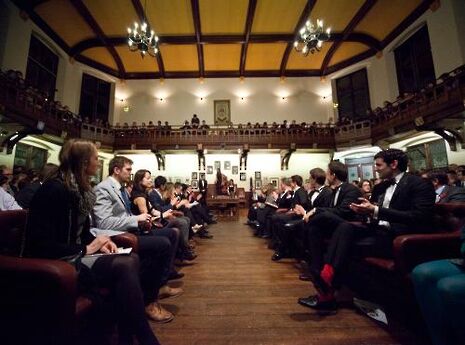We must hold the Union to account
Your ‘famous people club’ isn’t a game

As I wrote this, news was breaking of the attack by gunmen at the free speech debate which left one dead and three injured in Copenhagen. The question “What is freedom of speech?” invites maximalist responses and the opinion seemingly held by the majority is that anyone gets to say whatever they like, wherever they like.
The Cambridge Union appear not only to support this view, but to go further by inviting any and all offensive voices over their threshold. As they continually remind us, they’re an organisation independent from the university, and as such are quite literally impossible to hold to account. Over the last few years, and attracting particular publicity in recent months, they have taken advantage of this by inviting controversial speakers including Dominique Strauss-Kahn (2012), Marine Le Pen (2013), and most recently Germaine Greer. Each time they claim their goal is to generate stimulating debate; each time their excuse is “freedom of speech”.
The thing is, though, that freedom of speech doesn’t mean providing prestigious platforms and large audiences to anyone you fancy having a chat with. If you take that stance, and as such invite suspected rapists, racists and transphobes into possibly the most famous debating society in the world, you grant them credibility which they do not deserve, and which is not in the public interest. The Union is not Speakers’ Corner. The voices which the committee choose to share influence opinions, both within the debating chamber and around the world, as hateful messages are spread. These problematic individuals have freedom of speech: if they want to, they can go to London and stand on a soapbox. More worryingly, they have the entire internet at their disposal to offend people via personal blogs, Twitter, or Facebook, which reach audiences of millions. They don’t need the Cambridge Union to grant them freedom of speech, or to legitimise their views.
The Union needs to start taking into account the values and opinions of its members as well as its committee. The committee may, by and large, not feel threatened by airing the views of its speakers, but its membership is as diverse as the University (not that that’s saying much). Those inviting speakers would do well to recognise the real offense potentially caused to paying and contributing members, and aim to avoid it. I’m not suggesting that every individual should go through university without risk of offense or having to defend their values, but there’s no reason why a society should put them in that position for the sake of ‘stimulating debate’. Stimulating debates can be had without hand-picked controversy. Rape survivors, ethnic minorities, and gay and transgender people will meet enough opposition and threat in their lives without the Union providing platforms to the preeminent perpetrators of their abuse.
A friend of mine, who paid for Union membership in Freshers’ Week along with me and many others, went so far as to suggest that they should refund our membership if they refuse to act on members’ criticism. As implausible as this solution is, it does appeal to me. Without any form of accountability in place, there is nothing to stop the Union from inviting any bigot straight from their den into the debating chamber, where they can be questioned as though their prejudiced views are academic opinions that deserve thought and scrutiny. Threaten their plump bank account and they’d surely be more considerate in their selection. But these measures are painfully unrealistic, and we must therefore trust that they’ll be considerate in their selection. Recently, this trust has been broken.
It is outrageous, then, to label those who protest against these controversial invitations as dramatic, undemocratic or immature, which is how most no-platforming advocates have been portrayed recently. No-platforming is a form of protest non-comparable with censorship and other atrocities associated with true denial of freedom of speech. Unlike the Charlie Hebdo attacks, or the more recent attacks in Denmark, no one is being hurt; no one is being oppressed; no one is even being silenced. We’re simply asking you to recognise that when you decide to listen to someone whose views marginalise minorities and victimised individuals, you marginalise minorities and victimised individuals.
Your famous people club isn’t a game, so grow up. The Union seriously needs to rethink its modus operandi.
 News / Fitz students face ‘massive invasion of privacy’ over messy rooms23 April 2024
News / Fitz students face ‘massive invasion of privacy’ over messy rooms23 April 2024 News / Climate activists smash windows of Cambridge Energy Institute22 April 2024
News / Climate activists smash windows of Cambridge Energy Institute22 April 2024 News / Copycat don caught again19 April 2024
News / Copycat don caught again19 April 2024 Comment / Gown vs town? Local investment plans must remember Cambridge is not just a university24 April 2024
Comment / Gown vs town? Local investment plans must remember Cambridge is not just a university24 April 2024 News / Cambridge University disables comments following Passover post backlash 24 April 2024
News / Cambridge University disables comments following Passover post backlash 24 April 2024





